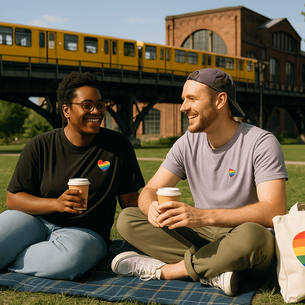In Germany, care is often thought of in traditional families: children care for their parents, partners look after each other. But in Berlin, the picture is more diverse. Here, adopted families—friends, neighbors, and partners—also take on responsibility for those receiving care.
Especially in the LGBTIQ* community, foster families are of great importance. They provide support where biological families are missing or lack contact. However, they also encounter barriers in the care system. We spoke with three relatives and family members who have taken on caregiving responsibilities in Berlin. They share their experiences, their self-care, and the strength of community. Experiences from fostering LGBTIQ Berlin: Voices from foster families:
“We are adopted siblings – and that is exactly how we live care”
Interview with Alex (52) and Daniel (49)
Question: How did you come to care for your friend Tom?
Alex: "Tom has been part of our chosen family for 25 years. We've danced together through the clubs in Kreuzberg, spent countless afternoons at Café Kirsche with coffee and cake, and laughed together at Ades Zabel's concert at the BKA Theater. He's simply one of us. When he needed care after an operation, it was immediately clear: We wouldn't leave him alone."
Question: What role does the chosen family play in this?
Daniel: "A huge one! We organize ourselves like a small shared apartment: I take care of the doctor's appointments, Alex does the shopping. Others from our adopted family step in when we need support. And sometimes we meet at the Prinzknecht for a beer after a long day to catch our breath. For us, that's a given – but in the care system, we often have to explain why our family isn't the traditional one."
Question: Were there any hurdles in the Berlin care system?
Alex: "Yes. We were told several times: 'You're not even relatives.' That hurt. As if our bond was worth less just because we weren't blood relatives. It was only through care counseling that we learned that we could still make many claims."
Question: What helps you persevere?
Daniel: "Our chosen family and the city. We treat ourselves to evenings where we simply don't think about caregiving. A drag night at SchwuZ or a concert at SO36 – moments like these give us strength and remind us that our lives remain colorful."

“As a lesbian couple, we had to fight for respect.”
Interview with Kerstin (61) and Ute (64)
Question: You decided to care for Ute's mother. How did that start?
Ute: "We live in Berlin-Neukölln and brought my mother to live with us. It was a given for us. But the reactions of care services were not always sensitive."
Question: What do you mean by that?
Kerstin: "There were comments like, 'Oh, you're just the friend,' even though we've been a couple for 30 years. That hurt and showed that queer-sensitive care isn't yet a given."
Question: What support was helpful for you?
Ute: "The Schwulenberatung Berlin (Berlin Gay Counseling Center) gave us tips on which providers are LGBTIQ*-friendly. And we used the relief amount to finance daily assistance—that gave us some breathing room."
Question: And what do you do for yourself?
Kerstin: "We consciously treat ourselves to little breaks. Sometimes we have breakfast at Café Morgenland, sometimes we visit the Kino International. And in the summer, we drive out to Wannsee, sit by the water, and unwind. These moments are worth their weight in gold."
“Sometimes a conversation at the Sunday club is my salvation”
Interview with Deniz (39)
Question: You care for your uncle. How did that come about?
Deniz: "My uncle is gay, 72, and has lived in Berlin since the 1980s. He was always there for me when I came out. Now I'm there for him. He's my family, even though we're not related."
Question: What is the biggest challenge?
Deniz: "I work full-time. In the evenings, I take care of him, help with the housework, and accompany him to appointments. Sometimes I'm just exhausted. The feeling of never being completely free is difficult."
Question: What gives you strength?
Deniz: "The meetings at the Sunday Club. There we talk about care, about life, about politics. There are evenings with readings, queer culture, and just honest conversations. I realize: I'm not alone, others have the same worries. That helps me keep going."
Conclusion: Voices that must be heard
Experiences of caring for LGBTIQ people in Berlin: Voices from chosen families
These examples show that caregiving in Berlin is diverse – and foster families bear a great responsibility. For members and relatives of the LGBTIQ* community, caregiving often means a double burden: practical challenges and the struggle for recognition.
But they also show that self-care, community, and queer-sensitive counseling centers make a difference. Berlin offers many resources—it's important to know and utilize them.
👉 You can get support from our care advice (§ 7a) , from our everyday help services or directly via our contact page .







